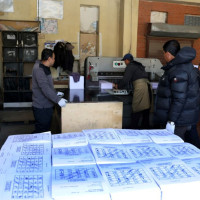- Friday, 9 January 2026
System sought to curb promoter shares misuse in stock market
Kathmandu, Aug. 4: The CDS and Clearing (CDSC) Limited is on the final stage to implement dual International Securities Identification Numbers (ISINs) to separate the promoter shares and public shares of the companies listed at the stock exchange to protect the interest of the investors.
With the implementation of the new rules, the promoters can't sell their shares before the conclusion of the lock-in period. Currently, some companies allegedly in hydropower sector are trading promotor shares by merging them with public shares before the end of the lock-in period.
The newly proposed Share Dematerialisation Directive 2025, which is already endorsed by the CDSC board, seeks to assign separate ISINs and NEPSE trading codes to promoter and public shares of listed companies. This change targets the widespread malpractice where promoters have allegedly sold locked-in shares illegally in the secondary market under a single ISIN, misleading retail investors.
The CDSC has forwarded the directives to the Securities Board of Nepal (SEBON) for final approval.
Once the Directive is implemented, such practices will be blocked, ensuring that lock-in founder shares cannot be traded until the expiry of their restricted period, typically three years.
An ISIN is a unique 12-digit alphanumeric code assigned to the securities – such as shares, debentures and bonds – when they are registered with the depository system such as CDSC in Nepal.
Application of the ISIN will not only create clear differentiation between the promotor and public share but also make it easy to track and analyse trading activity and ownership patterns for both the types of shares thus creating enhanced transparency.
It will also lead to price differences between promoter and public shares with chances for price hike in public shares since they make a small share – mostly 30 per cent of the total investment in a company.
However, the dual ISIN system can cause a decline in government revenue due to potential market contraction.
In a letter to the CDSC on July 28, Nepal Sharemarket Investors Association said that there were examples of promoters shares being traded during lock-in period. "Due to single ISIN number, promoters shares were also traded in bulk while the general investors are confused and sometimes cheated, and the stock market has witnessed an unusual decline due to the supply of securities in a large quantity," read the letter.
The Association noted that although the countries in the South Asian region have been practicing single ISIN number, they have a strong monitoring and regulatory system. If Nepal could implement the restriction to trade the promoters shares during the lock-in period effectively, single ISIN with flagging code number can also be effective, according to it. "Given the current practice and regulatory system, dual ISIN system is appropriate in case of Nepal. We hope that the guidelines created by the CDSC would include this provision," said the Association.
Likewise, capital market experts have also welcomed the initiative, viewing it as a crucial step in purifying Nepal’s share market. According to them, dual ISINs will prevent price manipulation, protect ordinary investors, and enhance transparency. The separation will ensure that founder shares cannot be disguised and offloaded as ordinary shares during lock-in, addressing one of the key sources of investor distrust.
Managing Director and Chief Executive of the CDSC, Prabin Pandak, said that the newly proposed rules are to apply uniform provisions for all types of companies and shares and to protect the investors interest while also checking the practice of arbitrary decisions of the CDSC itself.
CDSC statistics are full of differentiated decisions for various companies with some companies having single ISIN and some two while some have already mixed them.
Pandak said that the move has come after 15 years of regulatory inertia, despite the Central Depository Services Regulation of 2067 mandating the formulation of such procedures.
However, the directive has faced strong opposition from certain business groups including the Independent Power Producers’ Association of Nepal (IPPAN) and the Nepal Chamber of Commerce. They argued that dual ISINs conflict with the Company Act and international practices, and claimed that it may reduce market liquidity by limiting the supply of tradable shares during the lock-in period, potentially pushing prices upward.
But a share broker said that dual ISINs are already used in Nepal’s banking, insurance, and hospitality sectors. He rejected the claims that the reform will deter foreign investment.
"On the contrary, a cleaner, rule-based market is more likely to inspire investor confidence. The directive is expected to curb misuse of the conversion process, where some founders have previously bypassed regulations to liquidate shares and exit at the expense of ordinary investors," he said.
The proposed Directive also has a provision to converge the securities with different ISINs for which the respective company's general assembly should decide about it, notice about it should be published in a national paper twice, information should be given to the securities market and obtain approval of the SEBON.





-square-thumb.jpg)







-original-thumb.jpg)



